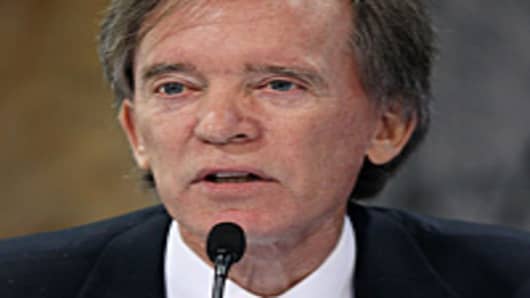So what exactly is Bill Gross arguing in the pages of the Financial Times today?
Gross, co-founder of PIMCO, says that cheap money is driving out good money. What he seems to mean is that interest rates have been pushed down so low that banks have lost the incentive to lend.
But I don’t get the basic logic at work here. If banks are not willing to lend at a given interest rate, interest rates should rise. The fact is the banks are not unwilling to lend — the constraint on lending is the lack of creditworthy borrowers who need credit.
Sure, the Federal Reserve sets the rate for the safest category of assets. But it doesn’t set the rate for private lending. If the rate for private lending falls toward the Fed funds target rate, that’s because more lenders are willing to lend at a lower price, not because they won’t lend.
It seems I'm not alone in not understanding Gross here. Paul Krugman of the New York Times chimes in:
But there’s nothing stopping banks from making loans at profitable rates to firms that want more credit; the zero bound applies only to safe official assets. The zero rate isn’t a price ceiling; it’s what happens when you push rates on safe assets as low as possible, precisely to encourage people to buy other things instead.
Gross seems to have joined the group of people who view current low rates as somehow unnatural, the result of policies that distort the market. But actually it’s quite clear that the “natural” rate of interest in the economist’s sense — the rate of interest that would match desired savings with desired investment at full employment — is negative. The zero bound is in fact a price floor rather than a price ceiling, enforced not by law but by the fact that people can always just hold cash.
Texas State University economics professor David Beckworth has a similar complaint:
What Gross fails to consider is that interest rates would be low now even if there were no Fed. This is because the economy is weak and as a result the natural interest — the interest rate consistent with economic fundamentals — is low. As I constantly tell my students, never draw any conclusions about the stance of monetary policy by looking just at the target policy interest rate. Instead, I tell them, look at the policy interest rate relative to the natural interest rate over the entire term structure. Given the large output gap and the economic uncertainty, the natural interest rate is currently low and may even be lower than the actual federal funds rate.
Questions? Comments? Email us atNetNet@cnbc.com
Follow John on Twitter @ twitter.com/Carney
Follow NetNet on Twitter @ twitter.com/CNBCnetnet
Facebook us @ www.facebook.com/NetNetCNBC



